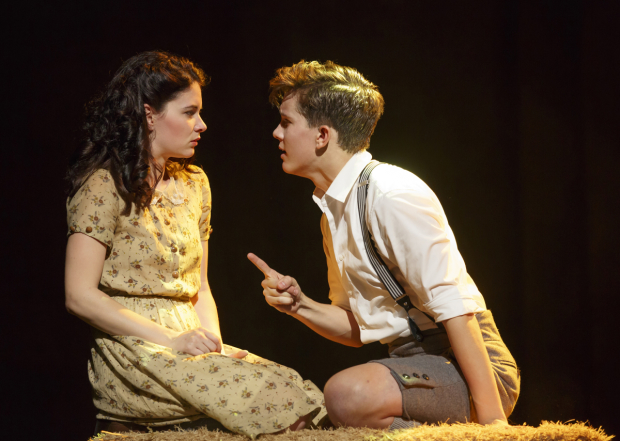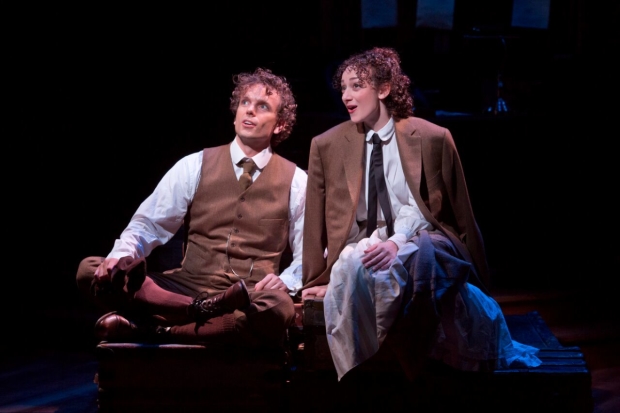Though the memory of Spring Awakening is still green—the original Broadway run of the electric rock musical ended only six years ago—Michael Arden’s jagged and heartfelt rendition for Deaf West Theatre, just transferred to Broadway after a Los Angeles engagement (here’s a link to Sylvie Drake’s review of that production for Cultural Weekly), makes it feel like a totally different, brand-new show. The juxtaposition of the story’s 1891 setting and the intense, heart-pumping, contemporary score by Duncan Sheik and Steven Sater remains fresh, but the added element of a combined deaf and hearing cast gives Spring an extra jolt. Sater’s book, derived from Frank Wedekind’s original play, focuses on a group of German teens discovering sexual urges which the staid adult society pushes them to either ignore or repress—with tragic results.

Credit: Joan Marcus
Arden explains in a program note that eleven years before the publication of Wedekind’s explosive play, the deaf community was dealt a serious blow at an education conference in Milan. The attendees passed a resolution advocating lip reading and attempting speech over sign language, forcing deaf students to imitate their hearing peers rather than developing communication skills of their own. The production has the oppressive adults not listening to the youngsters, both figuratively and literally.
This conflict is most sharply felt in a classroom scene where a tyrannical schoolmaster (a chilling Patrick Page) forces his deaf pupils to speak Latin translations rather than sign them. He mocks their gestures and their imperfect voices with shaming brutality. The pressure to conform— whether in speech or sexuality—pervades Arden’s production. Many of the roles are cast with deaf performers in period clothes while hearing actors dressed in modern duds provide their voices, acting as their caged modern selves trapped in the puritanical past. Dialogue is either signed or projected onto Dane Lafferty’s industrial nightmare of a set as words and signs meld and overlap through Arden’s eloquent staging and Spencer Liff’s poetic choreography.
Interestingly, the lead roles are played by unknowns while Broadway, film and TV vets take supporting turns. The main character Melchior, a rebellious student seeking to throw off the restrictions of his elders, is played by the vibrant Austin P. McKenzie, a hearing actor fluent in sign language. He makes this anguished rebel serve as a bridge between the hearing and deaf worlds. Melchior’s equally distraught sweetheart Wendla is given passionate life by Sandra Mae Frank and sensitive voice by Katie Boeck. Daniel N. Durant makes an intense Moritz, sort of a Sal Mineo to Melchior’s James Dean, and Alex Boniello provides his pained vocals. Andy Mientus and Krysta Rodriguez, both breakout performers in earlier Broadway productions and the TV series Smash, are arresting as the smug Hanschen and the lost Ilsa. The adult roles are shared by the hearing Page and Camryn Manheim and the deaf Russell Harvard and Marlee Matlin. Page, Manheim and Harvard all have moments of impact but the Oscar-winning Matlin in underused as Melchior’s compassionate mother.

Credit: Jeremy Daniel
While Spring Awakening is a refreshing challenge to the rigid Broadway template (still firmly in place despite game changers like Hamilton and Fun Home), Off-Broadway’s Daddy Long Legs is an unimaginative miniature employing almost every Main Stem cliche, musically and dramatically. Ironically, this two-hander also deals with a young protagonist searching for identity in a restrictive time period (in this case America in the first decade of the 20th century). Jean Webster’s original 1912 novel has previously been adapted into lighthearted movie musicals with Shirley Temple (Curly Top, 1935) and Leslie Caron and Fred Astaire (1955). Composer-lyricist Paul Gordon and book author-director John Caird both worked on a short-lived Broadway version of Jane Eyre and Caird collaborated on Les Miz. Daddy employs the same kind of soupy romantic score and soapy libretto. The only unusual music can be heard during a brief section of a comic song about snobby New Yorkers.
The story may have been charming in 1912, but it lacks tension and surprise today. Jerusha Abbot, an orphan girl writes letters to an unknown benefactor she assumes to be an avuncular old man, but he turns out to be her young suitor, the wealthy but noble-hearted Jervis Pendleton III. Fortunately, Megan McGinnis and Paul Alexander Nolan endow the two roles with wit and rich voice, making this postcard-sized show bearable for an overlong two acts.
Spring Awakening: Sept. 27—Jan. 24. Brooks Atkinson Theatre, 256 W. 47th St., NYC. Mon., Tue., Thu., 7 p.m.; Fri., 8 p.m.; Sat., 2 and 8 p.m.; Sun., 3 and 7:30 p.m. Running time: two hours and 15 mins. including intermission; $59-$149; (877) 250-2929 or www.ticketmaster,com.
Daddy Long Legs: Opened Sept. 28 for an open run. Davenport Theatre, 256 W. 45th St., NYC. Mon.—Tue., Thu.—Sat., 8 p.m.; Sat., Sun., 2 p.m.; Sun., 7:30 p.m. Running time: two hours including intermission; $59—$99; (212) 639-6222 or www.telecharge.com.
This review has previously appeared on ArtsinNY.com and Theaterlife.com.
